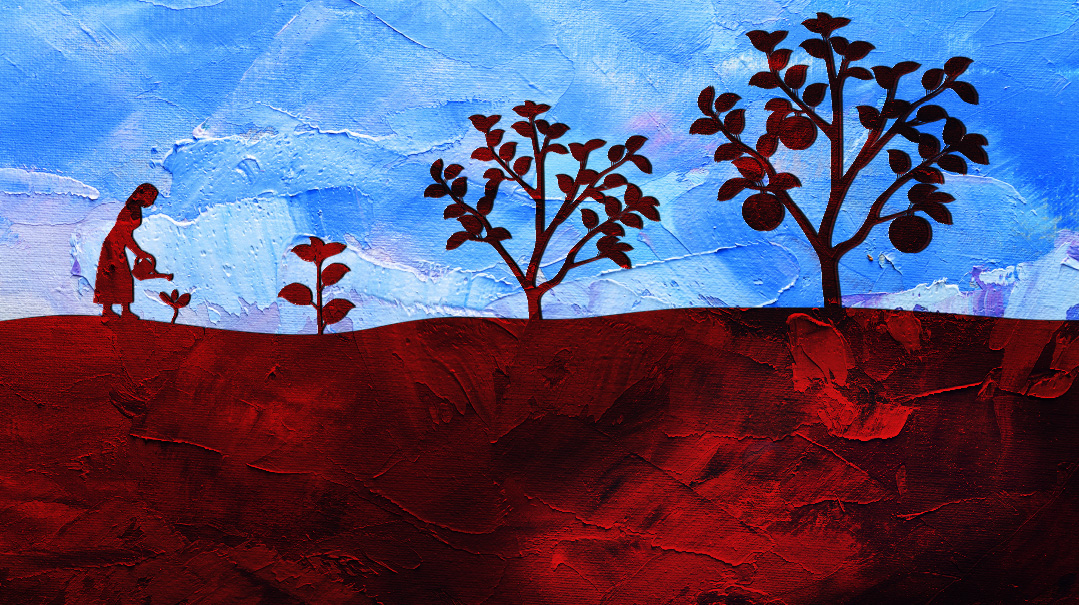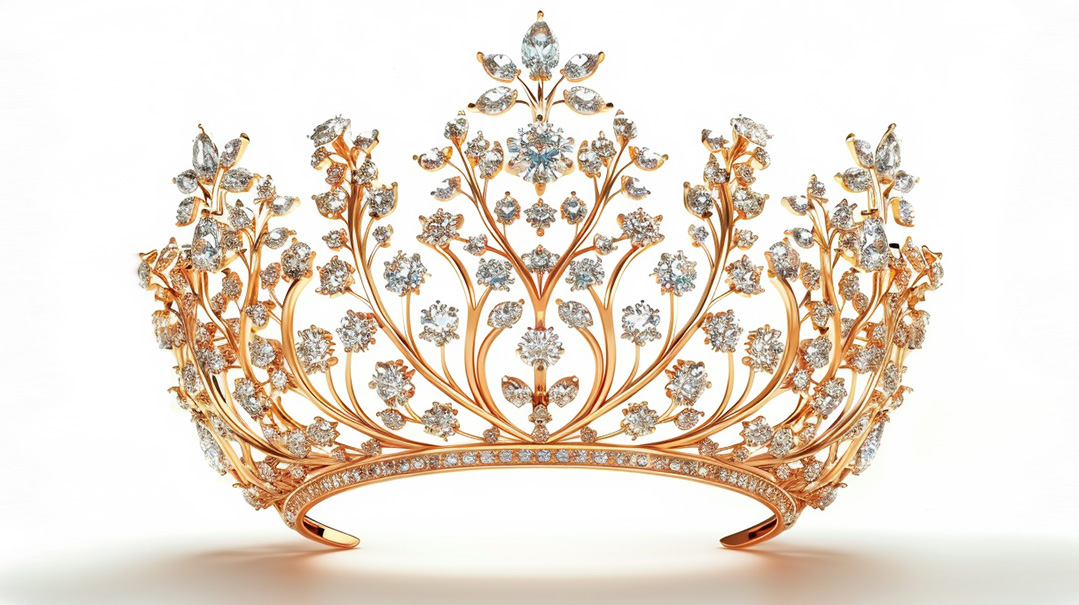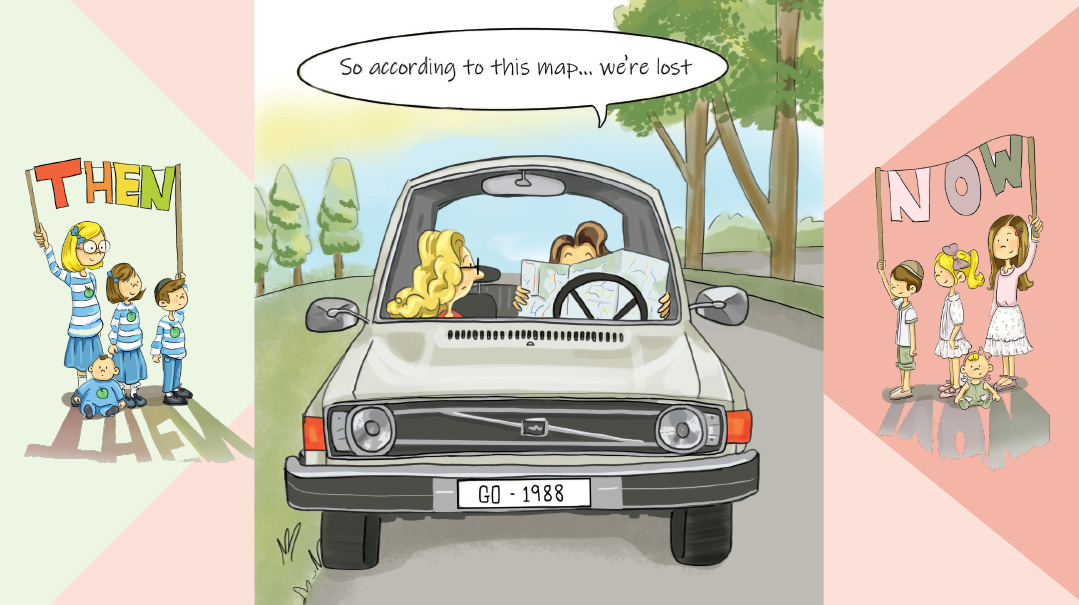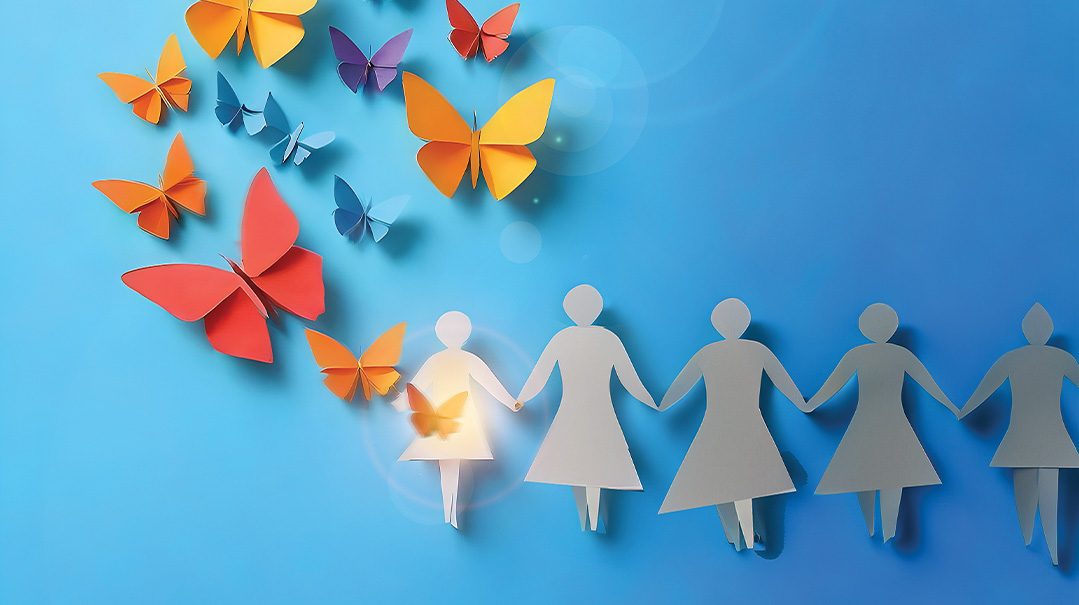Rooted in Love
| May 11, 2021Four families built through adoption give us a glimpse into their inner world

Talia
From across the ocean, I schedule a time over WhatsApp with Talia from Minnesota. I zoom in on the picture she shares, and see her beautiful family — her, her husband, their two daughters, and her parents, who look like they might just burst with nachas. It’s your standard Erev Shabbos photo with everyone in their festive best. There’s one glaring difference, though, and it’s that Talia doesn’t look anything like her parents.
Talia was adopted at four months old from Colombia. After her parents realized they wouldn’t be able to have children, they decided to adopt. Talia doesn’t know much about her biological parents because it was a closed adoption, but believes they were very poor and just couldn’t handle a child.
“I feel like the word ‘saved’ better describes how I feel than the word ‘adopted.’ My parents, who gave me everything, saved me from growing up poor, underprivileged, and Christian. I was converted at four months old, and then at 12 I had to choose Yiddishkeit for myself, which was a very big deal. But I have tremendous hakaras hatov that my biological parents gave me up for adoption, as well as to my parents for adopting me. I feel like the luckiest person alive.”
When I ask Talia if she has tried to meet her biological parents, she explains that she isn’t very interested, and besides, she doesn’t speak the language and there’s a yawning cultural divide. She sounds calm and content. When she describes her feelings toward her adoptive parents, her emotions run high.
“My parents gave me everything. They’re the best people in the world.” Her voice starts to break. “My parents love kids. If they could have, they would have had 20. They went to the other side of the world for me and took a chance, not knowing what would happen.”
For Talia, adoption was always just a part of life. Her sister was adopted from Minneapolis and looks more like their parents, but Talia is visibly darker and has different features. “I don’t recall my parents telling me I was adopted. It was just known, a fact of life that wasn’t considered a big deal. Sometimes I’d get teased by bullies, but it didn’t really bother me. My parents gave me so much love, and so did my community.”
The first time being adopted became an issue was when she entered shidduchim. Coming from a small, out-of-town community, her adoption was an accepted fact, but suddenly, she found herself in a world where it was considered a big deal. Shadchanim immediately tried to set her up with other adoptees, but as Talia said, “If the only thing in common is being adopted, it’s not going to work.”
Talia decided to be very open and upfront about being adopted. “It wasn’t hidden from me, and I had no intention of hiding it from anyone else.” She told her husband on their first date that she was adopted, and he, too, felt that it wasn’t an important element when choosing a spouse.
She was worried that becoming a mother would be triggering, but it wasn’t. Both of her daughters are light-skinned. “I expected little brown babies, like myself, but no.” What was exceptionally special, though, was sharing her pregnancy with her mother, who’d never experienced carrying a child. “I’d tell my mother about each twinge, each kick. She was over-the-moon excited and in a way living vicariously through me, but in a good way. We both experienced it for the first time, together.”
Talia’s daughters are five and two and they don’t know their mother was adopted, not because it’s a secret, but because there was never a real, compelling reason to tell them. “Adoption isn’t anything to be ashamed of. I’m just waiting until they can emotionally understand, and honestly, I want to get it over with. Their parents love them, and they have the best grandparents in the world. Nothing else matters.”
Sara
Sara grew up in a bustling frum household, one of seven siblings, five who were biological children and two who were adopted. Her father, a real-estate lawyer, and her mother, a devoted homemaker, had always wanted to adopt. In fact, they discussed adoption on their first date. Both of them felt there should never be a Jewish child lacking a home.
“Growing up, we all just knew that Hashem sends some children through Ima’s tummy, and some He sends a different way,” says Sara. “I entered our family a different way. My adoption was a closed one. My parents don’t know anything about my biological parents other than that they were very young and from very frum families. They don’t even know their last names. My parents gave me so much love. They tried hard to ensure I never felt unloved, and I don’t feel unloved. Sometimes I just feel out of place.”
Growing up, Sara would occasionally feel jealous of her non-adopted siblings. “I’d think about how my brothers would get called up to the Torah as Levi’im, like my father, and feel a pang. When we learned in school that Jewish lineage is determined by the mother, I started to feel anxious. Yes, my parents know and have proof that I was born to a Jewish mother, but I wanted to know her. These feelings only intensified when I became a teenager.
“I spent many years searching, and I was lucky enough to have mechanchim in my life who spent a lot of time with me and my questions. I found myself asking a lot of hashkafic questions about parenthood in Torah and how a child is brought into the world. What does it all mean? Why was this Hashem’s plan for me?”
Sara would try to speak to the brother who was also adopted about their shared circumstance, but his feelings around his situation were so different from hers, it wasn’t a source of comfort. While Sara had a steady feeling of being unsettled and wanted to know more about her birth parents, her brother wanted to know nothing and felt no need to discover any information. Talking to him made her feel even more alone.
“There were girls in school whose parents were divorced, and they had each other,” says Sara. “There were girls who had a sibling who was off the derech and they had each other. All these different groups had someone at some point, but I was all alone. Even today, I’ve met other adoptees, but not in the frum community. I’ve never casually met another frum woman in the park or at PTA who has been adopted.”
Sara’s parents were always open with her, explaining that they didn’t know much about her biological parents, but they would always support her in trying to find out more. She didn’t want to rock the boat and press for more, but when she became a mother herself, she experienced grief.
When she first became pregnant, she suffered from mild depression. She kept being asked about family medical history, and while it wasn’t the first time she’d been asked that question, it was the first time it pained her not to know the answer.
“Before that it was like, okay, no big deal. But once I was expecting a child, I felt helpless and irresponsible not knowing my family medical history. I know it’s not my fault, but I couldn’t shake that feeling. My mother would share what it was like for her when she was pregnant, but every time she did, I wished, in fact I would fantasize, that she could tell me what it was like when she was pregnant with me.”
For Sara, becoming a mother did offer some healing, but also aroused even more questions. Her firstborn has black hair and green eyes, features that neither she nor her husband have. Sara felt exhilarated every time she looked into her son’s eyes; it was as though she was looking into a mirror and seeing where she came from. At the same time, she felt intense sadness that she didn’t know from whom her baby had inherited his green eyes.
“All of a sudden, well, after three days of labor, they handed me my baby. I cried so much and so hard, I could hardly see him. Yes, I was emotional and overjoyed about meeting my son, but there in the delivery room, for the first time in my life, I received an incredible gift — for the first time in my life I was in the room with a blood relative.”
Eli
Eli entered my apartment with his wife and newborn son, eager to share his story. He’d grown up in a large mainstream Jewish community with one older brother whom he become closer with as he hit his teens.
One ordinary afternoon, when Eli was 16, he went with his brother and sister-in law to visit his grandparents. When his grandmother remarked that he was “tall, dark, and handsome,” Eli innocently mentioned how strange that was considering neither of his parents were tall or dark.
He didn’t understand why his brother and sister in-law suddenly looked so nervous. Eli’s brother had been hiding the fact that Eli was adopted. He felt holding back this information was a betrayal to the younger brother whom he loved so much, and after that innocent comment, he couldn’t take it anymore. He pulled Eli aside, and told him right then and there, “You were adopted.”
In a moment, Eli’s world was flipped upside down. He sat silently as his brother called their parents to warn them that Eli knew.
“My parents didn’t speak to my brother for four months. I came home and my mother was upstairs crying. I looked at my father’s pained face, and the first thing I said was, ‘Nothing has changed.’ He just hugged me. It was weird because it wasn’t my pain. It was my parents’ pain, and I was comforting them.”
Over the next few days, Eli’s parents explained why they never told him (they’d consulted their rav and made the decision based on their circumstances) and shared what they knew about his biological parents. Both Eli’s biological mother and father were mentally ill, incapable of caring for a child, so their extended families arranged the adoption.
“My father gave me a picture of my parents, and it took my breath away. There they were, tall and dark. More importantly, I looked at the picture of them, and I saw myself.”
How did Eli cope with finding out his true identity at such a sensitive age? “My parents tried to help me as much as they could with the keilim they had,” he told me. “They sent me to a therapist, they helped me gather more info about where I come from, and yeah, they did eventually forgive my older brother for telling me. My principal spent a lot of time with me, my friends were supportive, and what can I say? Music helped a lot.”
When I ask Eli whether he has met or wants to meet his biological parents, he lets out a big sigh. “A few years before I found out, my father died unexpectedly. They don’t know what happened. I succeeded in making contact with my biological aunt, who is my biological mother’s caretaker. She’s given me information, but has made it clear that my mother would be unable to handle meeting me.”
Eli explains that one of the most painful aspects for him as an adoptee is the denial of his true self. “My parents and others have remarked that I really am my parents’ child, just as if — and this is important — I’m their biological child. But I’m not. And as long as my parents, who adopted after suffering from infertility, live in the fantasy of ‘as if,’ my true self, my true identity, is denied. I’m not really my parents’ child. To say so is a denial of reality. And that denial made me feel that my real identity wasn’t being accurately appreciated, and a bit as though I was betraying my parents by having different biological parents. This is exacerbated in the frum world, where there is such an emphasis on yichus.
“I started a blog called frumadoptee.com for frum adopted children. I recently got an email from a woman in her seventies, who’s already a grandmother, in which she shared her pain about feeling like she doesn’t have a voice. She wrote, ‘I read all the magazines and everyone, it seems, has a voice — the older singles, those struggling with infertility, special needs, divorcees… What about us? When do we get to be recognized?’ ”
When I ask Eli about how being adopted has affected him as a father, he once again lets out a big sigh, and speaks with his eyes turned toward the floor. “Birth is overwhelming. All of a sudden there’s this baby and there are so many emotions. I remember feeling so grateful and so sad at the same time.
“You look at this helpless little baby and you think, okay, logically, I know it was the right thing that they gave me up for adoption. My biological parents couldn’t take care of me. Baruch Hashem they did that.”
Eli glances up knowingly at his wife, then into her arms where his newborn son safely sleeps. “But then I look again at this precious and helpless little baby of my own, and I can’t help but wonder, even though it may not be logical: How does anyone give this up?”
Chaya
More than anything, Chaya Berg and her husband wanted to become parents and raise their children l’Torah, l’chuppah, ul’maasim tovim. In addition to davening, they put all of their efforts into fertility treatments. The Bergs were living in a small, warm, out-of-town kollel community on the West Coast and had become the resident “kvatter couple.” Their community was respectful of the couple’s privacy and supportive in any way they could be.
After 12 years, when it was clear that the route of medical intervention wasn’t the one that would bring about their yeshuah, they decided to look into adoption. They first consulted with their rosh yeshivah, who had been guiding them through their entire journey to parenthood. He was supportive and encouraging of the adoption idea. They also consulted with their parents, who made it clear they were behind them 100 percent.
Once they decided to adopt, they met with an adoption facilitator, who strongly recommended they not only be open about their plans to adopt, but to tell everyone they knew, as word of mouth often proved to hasten the process. Finding a birth mother who for whatever reason needed to give up her baby was what typically took the longest, so the more people looking out for them, the better.
“While it wasn’t a secret we were going through fertility treatments, it was still a private matter,” Chaya says. “Because of the nature of adoption, it wasn’t hush-hush at all. We did a total 180.”
Once the Bergs started pursuing adoption, they had a lot of paperwork to complete and bureaucracy to get through. When the facilitator found a birth mother who was interested in giving her baby to them, both the facilitator and their rosh yeshivah advised the couple to go silent again and not to breathe a word about it to anyone.
“The birth mother was Jewish, which was a huge brachah for many reasons,” Chaya says. “The following months, we waited anxiously for the day to arrive, and two days after his mother gave birth, we brought our first son home. Our family and friends knew we were trying to adopt, so it wasn’t a surprise when we called and said ‘Mazel tov! We brought our son home today!’ Everyone was ecstatic for us. The feeling at the bris was absolutely euphoric. It wasn’t just our simchah; it felt like the simchah of a community of people who cared and were davening for us, and were truly happy not only for us, but with us.”
Chaya’s mother came from out of state after they brought their son home and assisted with everything from cooking, cleaning, and helping Chaya ease into motherhood.
A few years later, the Bergs were ready to try adopting again. Their adoption facilitator once again found a Jewish mother who was looking for adoptive parents. A few months later, they brought home another baby boy.
From the time her boys were very little, Chaya made a point of reading books to them about adoption and discussing how every family is built differently. She did it slowly and in an age-appropriate way, so that it was just a normal part of life, rather than waiting to tell them and having a big revelation.
“Of course, as my kids reach each life stage, they need to reprocess, and we have always answered them and encouraged them to ask whatever questions they want,” Chaya says. “Both adoptions were closed adoptions, meaning the parents don’t want their children to know their identities or have any contact. We don’t know a lot about them, but because both birth mothers were Jewish and we have the documentation for it, we know more than most other closed adoptions.”
Whenever one of her children has asked Chaya about his birth mother, she tells him that she was a very brave woman who did what she knew was best for her child, even though it was difficult.
Chaya strongly believes that part of what helped them through the adoption process and even after was that everyone in their community was not just accepting, but also encouraging. She rarely received invasive questions, and when she did, it was usually from people outside her community. Chaya would respond by saying, “That’s really my children’s business, so I’m going to keep it private for them.”
The only time she recalls anyone saying anything to her children was when her eldest was a teenager and was on a trip to a large, in-town community. His biological family is Sephardi, and on the trip, a child made a derogatory comment about his skin tone. Chaya believes that had they lived somewhere else, he would have gotten more comments like that.
Chaya was, however, particularly worried about how her children’s shidduchim might be affected by their being adopted. “Hashem said, ‘Ha ha, I have your back,’ and we made beautiful shidduchim for both of our boys with ease and with simchah.”
“Everyone needs so much siyata d’Shmaya in raising children. Sometimes it’s a smooth process and sometimes it’s bumpy. It’s always up to the Borei Olam. Maybe percentage-wise there are more bumps with kids who are adopted. For us, the whole experience was positive, and I believe it’s also been positive for my children. If I could go back in time before we adopted our boys, I wish I could just tell myself what I now know, and that is that this is truly going to be great.”
What to Say
You discovered someone is adopted? Here’s how adoptees would like you to respond:
Do:
- Give us space and give us a voice. Don’t treat us like a shameful secret.
- Ask me if I want to share my story.
- Follow my lead. If I don’t bring it up, then you shouldn’t either. If I do, then it’s rude to ignore what I just said.
Don’t:
- Don’t say I’m basically my parents’ biological child. I’m not — and denying that fact denies my existence.
- Don’t ask me if I feel unwanted. That’s rude.
- Don’t assume all adoption circumstances are the same.
- Don’t tell other people my story. It’s mine and it’s my decision if and when I want to share it.
(Originally featured in Family First, Issue 742)
Oops! We could not locate your form.











